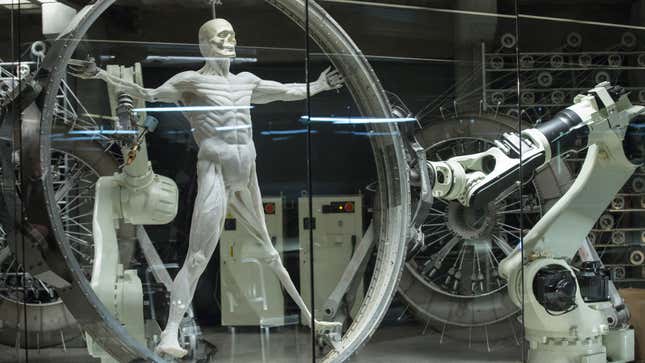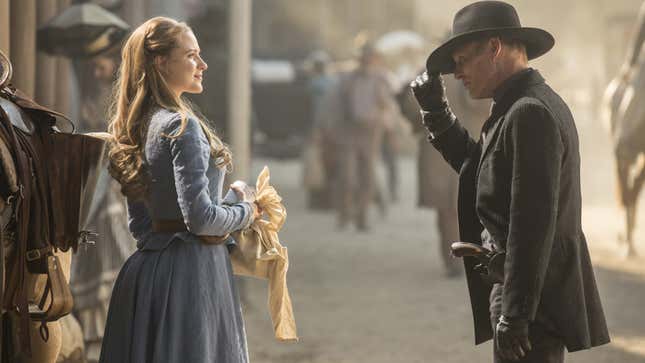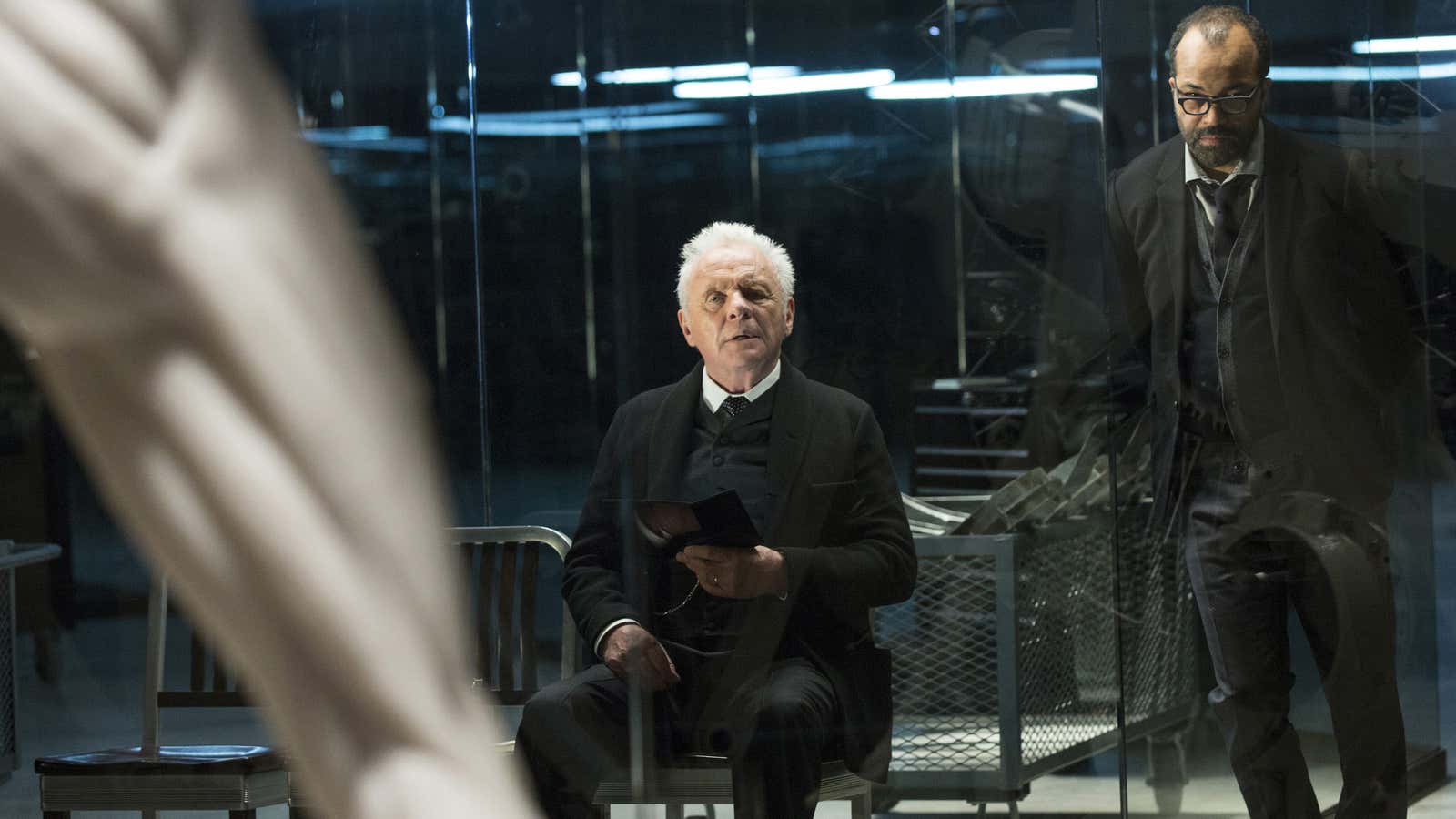“Everything in this world is magic, except to the magician.”
Gnomic pronouncements like this make Dr. Robert Ford, played by Anthony Hopkins in the new HBO sci-fi Western Westworld, the kind of charismatic boss that both enthralls and terrifies.
The creator of a sprawling Western theme park populated by ultra-realistic androids, the messianic Ford is speaking both about our own natural world, but also about the artificial world he created: one where wealthy human clients come to indulge their most base desires. Ford is the magician of this strange trick, and the show dwells behind the scenes of the park’s day-to-day operations, showing how that magic is made.
Created by Jonathan Nolan and based on the 1973 Michael Crichton film of the same name, Westworld has a trick of its own. Advertised as a science fiction thriller fused with a classic Western, the long-awaited series, which premieres Sunday (Oct. 2), is, at its essence, a workplace drama.
Instead of Mad Men‘s 1960s Madison Avenue advertising agency or The Office‘s paper company in present-day Pennsylvania, Westworld is set sometime in the near future at a replica of an American West outpost (we’re not told where exactly Westworld is on Earth, if it’s on Earth at all.) Where Mad Men explored gender and race in the workplace and the eternal battle between creativity and commerce, Westworld considers an element of work all too familiar in today’s age of tech monopolies, “moon shots,” and venture capital: ambition.
Westworld is in the business of making men gods. Guests pay $40,000 a day to do whatever they please to the helpless robots, called hosts. Meanwhile, the workers control the hosts from afar like a giant game of The Sims. Everyone here is impersonating a deity. And Ford, the chief architect of Westworld, is the most divine of them all. At one point, he literally moves mountains.
The employees who populate this workplace are far from pencil-pushers. Instead of discussing TPS reports, they argue over which “narratives” to craft for the park’s guests to enjoy. Much of the show’s action revolves around their work challenges: They debate toying with the androids’ code to make them more or less humanlike. They run through contingency plans when one of their synthetic hirelings goes off script.
And the show portrays a workplace where there’s no clocking out (another aspect that might feel familiar to the ”work martyrs“ of today’s 24-hour digital workplaces). Westworld’s staff don’t get to see their families. None of the employees have lives outside of work to speak of. They live and breathe Ford’s world, at once its operators and its prisoners.

Of course, Westworld has its share of toxic office politics. Hopkins’ Ford constantly resists attempts by Theresa Cullen (Sidse Babett Knudsen), a quality assurance manager who represents Westworld’s parent company, to keep him in line. Elsie Hughes (Shannon Woodward), a young female programmer who notices that something with the robots is very wrong, is patronized and ignored by her older male colleagues. And Lee Sizemore, (Simon Quarterman) the park’s douchey narrative director, works for months on a lavish new storyline, only for Ford to instantly dismiss it. (Ford, as it turns out, is scheming a mysterious new storyline of his own.)
Central to the inner-workings of Westworld is Bernard Lowe (Jeffrey Wright), the head of the programming division, who’s responsible for the code that enables the hosts to appear so humanlike. They’re so humanlike, in fact, that two of them—rancher’s daughter Dolores Abernathy (played with stunning nuance by Evan Rachel Wood) and brothel madame Maeve Millay (Thandie Newton)—start remembering things that they shouldn’t.
Every time a guest kills, rapes, or mutilates one of the hosts (which happens a bit too often for a network that’s been called out for its problem with sexual violence), Westworld workers fix them up, wipe their memories clean, and send them back out into the park where they’re subject to the same torment again and again, like a twisted version of Groundhog Day. But it’s all okay, right? The robots don’t actually feel anything? That’s precisely what Westworld promises to answer.
Like any company, Westworld must answer to its investors. And for all of Ford’s moral ambiguity, the park’s shareholders are an equally alarming off-screen presence. Westworld has financial goals to meet, and employees are under constant pressure to meet them. Just as the hosts are controlled by Westworld, Westworld is managed by its investors, and the perils of a traditional hierarchy are on full display. Everyone has their overlords.

Watching Westworld, you can sense a grand mythology unfolding before your eyes. The show’s biggest strength is its world-building, an aspect of screenwriting that many television series have botched before. Often shows will rush viewers into plot, forgetting to instill a sense of place and of history, that you’re watching something that doesn’t just exist in a vacuum but rather is part of some larger ecosystem. Not since Lost can I remember a TV show so committed to immersing its audience into the physical space it inhabits. (Indeed, Westworld can also be viewed as a meta commentary on the art of screenwriting itself: brainstorming narratives, building characters, all for the amusement of other people.)
Westworld is especially impressive because it builds two worlds at once: the Western theme park and the futuristic workplace. The Western half of Westworld might be the more purely entertaining of the two, with its shootouts and heists and chases through sublime desert vistas. Behind the scenes, the theme park’s workers show how the robot sausage is made. And as a dystopian office drama, the show does something truly original.
